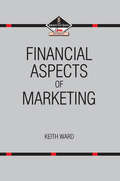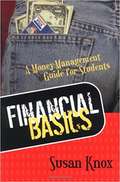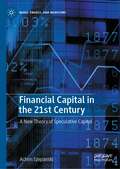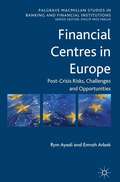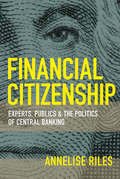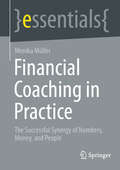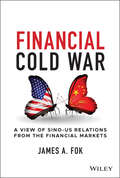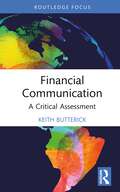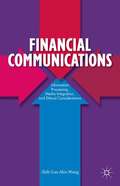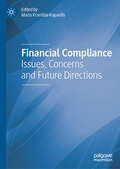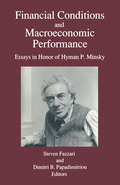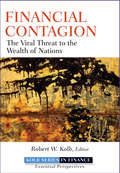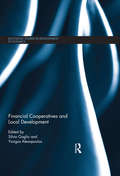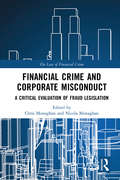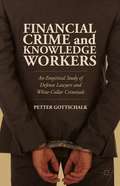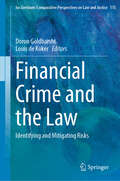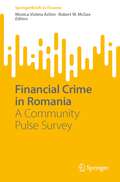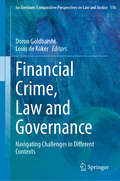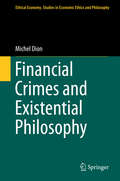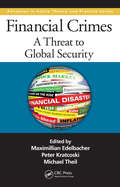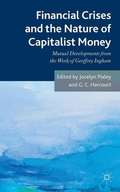- Table View
- List View
Financial Aspects of Marketing
by Keith WardFirst published in 1989. Financial Aspects of Marketing is designed particularly for students taking the Part 2 Certificate paper in Financial and Management Accounting of the Chartered Institute of Marketing. The increased emphasis on marketing issues of the new paper and the use of financial information as an aid to decision making provide students with the ability to be 'financially literate'. Practical applications of financial concepts and techniques and their relevance to the marketing function are demonstrated. Contents include Introduction and overview: Analysis -establishing the starting point; Planning - setting objectives and strategies: Control - monitoring achievements: Applications and examples.
Financial Assets, Debt and Liquidity Crises: A Keynesian Approach
by Peter Flaschel Matthieu Charpe Carl Chiarella Willi SemmlerThe macroeconomic development of most major industrial economies is characterised by boom-bust cycles. Normally such boom-bust cycles are driven by specific sectors of the economy. In the financial meltdown of the years 2007-2009 it was the credit sector and the real-estate sector that were the main driving forces. This book takes on the challenge of interpreting and modelling this meltdown. In doing so it revives the traditional Keynesian approach to the financial-real economy interaction and the business cycle, extending it in several important ways. In particular, it adopts the Keynesian view of a hierarchy of markets and introduces a detailed financial sector into the traditional Keynesian framework. The approach of the book goes beyond the currently dominant paradigm based on the representative agent, market clearing and rational economic agents. Instead it proposes an economy populated with heterogeneous, rationally bounded agents attempting to cope with disequilibria in various markets.
Financial Autonomy: The money book that gives you choice
by Paul BensonFinancial Autonomy is a fresh, innovative book about money. But unlike most money books, it's not focused on making you the richest person in your street, or worse, the richest person in the cemetery. Instead, the focus of this book is on gaining choice. What can you do on the money side of your life, to provide you with the choice to pursue maximum happiness in all the other aspects of your life.Have you ever listened to a guest on a radio program or a speaker at an event talking about some amazing experience they've had? Perhaps it was traveling through Tibet in a beaten-up Land Rover, sailing around the world, jumping out of planes in a wing suit, or starting a business or charity of their own, driven by a magnitude 10 passion to make an impact.And when listening to these inspiring stories, have you ever wondered how they managed to organise their life so that it was possible? Do you wish you could organise your life to do what's important to you?Financial Autonomy is a book about money but it's equally about gaining choice. If you get the money side of your life right, you will have the choice to pursue maximum happiness in all the other aspects of your life. Personal finance expert Paul Benson believes there are three vehicles to create enough wealth to have the choices you desire are: (1) Investing in shares; (2) Investing in property; and (3) Working for yourself (starting a side hustle or small business). He explores these in detail, as well budgeting and saving - and as you'd expect, he gives readers a choice of strategies they can adopt to succeed in these areas.
Financial Basics: A Money-Management Guide for Students
by Susan Knox<p>Jason is typical of today's college students, who are assuming unprecedented debt burdens because of relaxed limits on student loans and easily obtained credit cards. Many on college campuses are calling it a fiscal crisis. <p><i>Financial Basics</i> tackles the gaps in the personal financial knowledge of college students. Beginning with debit-credit card issues, student loan decisions, and the challenge of managing and reducing debt, Knox walks readers through money management. She skillfully addresses the how-to's of checking accounts, spending plans, emergency funds, and credit histories. She discusses financial personalities and the emotions of money, as well as practical record-keeping and simple filing techniques. <p>In <i>Financial Basics</i>, Knox blends her extensive money-management experience with her desire to inform and help students master their finances: she shares experiences about money lessons learned in college, and offers sound solutions and advice for students and their families. Since everyone does not handle money in the same way, Knox gives money-management options for readers to find their best way. The book includes helpful worksheets and is written in an easy-to-read style, using testimonials and examples that will ring true to students.</p>
Financial Calculus
by Martin Baxter Andrew RennieFinance provides a dramatic example of the successful application of advanced mathematical techniques to the practical problem of pricing financial derivatives. This self-contained 2002 text is designed for first courses in financial calculus aimed at students with a good background in mathematics. Key concepts such as martingales and change of measure are introduced in the discrete time framework, allowing an accessible account of Brownian motion and stochastic calculus: proofs in the continuous-time world follow naturally. The Black-Scholes pricing formula is first derived in the simplest financial context. The second half of the book is then devoted to increasing the financial sophistication of the models and instruments. The final chapter introduces more advanced topics including stock price models with jumps, and stochastic volatility. A valuable feature is the large number of exercises and examples, designed to test technique and illustrate how the methods and concepts can be applied to realistic financial questions.
Financial Capital in the 21st Century: A New Theory of Speculative Capital (Marx, Engels, and Marxisms)
by Achim SzepanskiThe book’s central theme is to develop a new theory of speculative capital related to other forms of capital, the world market, and the state. Unlike most Marxist and heterodox theories, the book distinguishes credit and fictitious capital from speculative capital to show its hegemony today in the capital markets. Speculative capital structures and also controls the so-called “real capital.” The method is Marxist while also incorporating material from contemporary Marxist and heterodox authors like John Milios, Robert Meister, Tony Norfeld, Li Puma, Harald Strauß, Michael Heinrich, Suhail Malik, Bichler/Nitzan and Ellie Ayache. Offering a comprehensive study of the logic and mode of existence of capital in the 21st century, the book will be of interest to academics and students of monetary and financial economics alongside political economy.
Financial Centres In Europe
by Rym Ayadi Emrah ArbakAssesses to what extent increased international cooperation could help selected financial centres in Europe respond to the future risks and opportunities facing them. The book identifies challenges that the jurisdictions face in coming years by means of representative samples and systematic comparisons of financial centres.
Financial Citizenship: Experts, Publics, and the Politics of Central Banking
by Annelise RilesGovernment bailouts; negative interest rates and markets that do not behave as economic models tell us they should; new populist and nationalist movements that target central banks and central bankers as a source of popular malaise; new regional organizations and geopolitical alignments laying claim to authority over the global economy; households, consumers, and workers facing increasingly intolerable levels of inequality: These dramatic conditions seem to cry out for new ways of understanding the purposes, roles, and challenges of central banks and financial governance more generally. Financial Citizenship reveals that the conflicts about who gets to decide how central banks do all these things, and about whether central banks are acting in everyone’s interest when they do them, are in large part the product of a culture clash between experts and the various global publics that have a stake in what central banks do.Experts—central bankers, regulators, market insiders, and their academic supporters—are a special community, a cultural group apart from many of the communities that make up the public at large. When the gulf between the culture of those who govern and the cultures of the governed becomes unmanageable, the result is a legitimacy crisis. This book is a call to action for all of us—experts and publics alike—to address this legitimacy crisis head on, for our economies and our democracies.
Financial Coaching in Practice: The Successful Synergy of Numbers, Money, and People (essentials)
by Monika MüllerThis essential provides a comprehensive introduction to the definition and significance of financial coaching. You will get an overview of international research in this field and learn about the crucial role psychology plays in financial decisions. The author presents the latest research findings that clarify whether intellect, intuition, or emotion are decisive for good decisions. Financial coaching begins with diagnostics, which includes measuring risk tolerance as well as biographical work on the individual psychodynamic effects of money projections. The reader learns how coaching helps to shed unfavorable decision patterns and successfully implement new ones. Practical insights into the profession of financial coaching and the underlying core competencies round off the book. You will expand your understanding of financial coaching and can use the insights from this book for your own success.
Financial Cold War: A View of Sino-US Relations from the Financial Markets
by James A. FokA groundbreaking exploration of US-China relations as seen through the lens of international finance Rising tensions between China and the United States have kept the financial markets on edge as a showdown between the world’s two largest economies seems inevitable. But what most people fail to recognise is the major impact that the financial markets themselves have had on the creation and acceleration of the conflict. In Financial Cold War: A View of Sino-US Relations from the Financial Markets, market structure and geopolitical finance expert James Fok explores the nuances of China-US relations from the perspective of the financial markets. The book helps readers understand how imbalances in the structure of global financial markets have singularly contributed to frictions between the two countries. In this book, readers will find: A comprehensive examination of the development of financial markets in both China and the US, as well as the current US dollar-based global financial system Insightful observations of the roles of technology, innovation, regulation, taxation, and politics in the markets, and on their resulting effect on US-Sino relations Thorough explorations of the role of Hong Kong as an intermediary for capital flows between China and the rest of the world Suggestions for how, balancing the many varying interests, policymakers might be able to devise effective strategies for de-escalating current Sino-US tensions Financial Cold War is a can’t-miss resource for anyone personally or professionally interested in the intersection of economics and international relations, financial markets, and the infrastructure underlying the international financial system.
Financial Communication: A Critical Assessment (Routledge New Directions in PR & Communication Research)
by Keith ButterickThis essential guide to financial communication provides a concise critical overview of this increasingly important field. It challenges existing assumptions about the role and significance of financial public relations (PR) and investor relations, and the dominant paradigm of shareholder value. This book explores how the dominant paradigm in financial PR is based on the methodologically and historically incorrect assumption of symmetrical communication.Highlighting the importance of financial communications in the corporate hierarchy where it is often a direct function of the Finance Director, this book critically assesses its ideological role in normalising the idea and role of ‘the market’ and promotes the neoliberal view that the sole function of the public company is to increase shareholder value. It opens up new theoretical perspectives by considering retail investor behaviour from the perspective of fandom theory through the behaviour of investors during financial booms, busts and bubbles.This volume will be of interest to researchers in the fields of PR, financial communication, accounting and financial management as well as practitioners working in financial PR and investor relations.
Financial Communications
by Shih-lun Alex WangFinancial Communications showcases why it is crucial for financial institutions to enhance key communication processes, rebuild trust with its customer base, improve relationships, and derive better brand awareness amongst key stakeholders within the industry.
Financial Compliance: Issues, Concerns and Future Directions
by Maria Krambia-KapardisThis book explores the fundamental elements and risks that impact the compliance officer’s work. Following a comprehensive understanding of the role of a compliance officer, by engaging with themes of compliance officers’ liability, expectations, risks and effectiveness, it provides practical answers by leading academics and practitioners in the field. This work also draws on how other areas, such as GDPR, financial regulation and whistleblowing, challenges on compliance officers and provides a way forward to convert these challenges into opportunities. The discussion of compliance challenges and practices in Australia, Europe and the United States provides critical insights into the development of compliance in today’s financial environment. Financial Compliance: Issues, Concerns and Future Directions provides an invaluable working resource for academics, practitioners and a general audience interested in understanding and developing an effective compliance culture.
Financial Conditions and Macroeconomic Performance: Essays in Honor of Hyman P.Minsky
by Steven M. Fazzari Dimitri B. PapadimitriouThis collection of papers on financial instability and its impact on macroeconomic performance honours Hyman P. Minsky and his lifelong work. It is based on a conference at Washington University, St. Louis, in 1990 and includes among the authors Benjamin M. Friedman, Charles P. Kindleberger, Jan Kregel and Steven Fazzari. These papers consider Minsky's definitive analysis that yields such a clear and disturbing sequence of financial events: booms, government intervention to prevent debt contraction and new booms that cause a progressive buildup of new debt, eventually leaving the economy much more fragile financially.
Financial Contagion: The Viral Threat to the Wealth of Nations (Robert W. Kolb Series #604)
by Robert W. Kolb"Financial Contagion: The Viral Threat to the Wealth of Nations covers a lot of territory. It is, of course, terribly important to analyze case histories to discover potential triggers, mechanisms of transmission, and viable ways to contain the damage of financial contagion. The problem is, as these articles amply demonstrate, that there’s always a new virus or a mutation of a former one lurking in some corner of the financial world. We don’t know what it is or where it is. And, even if we had some inkling, there’s almost never enough time to develop a financial flu shot." --SeekingAlpha.com The latest insights on financial contagion and how both nations and investors can effectively deal with it. The domino-style structure in which the financial system exists is a perilous one. Although historically, the financial system has been able to deal with major shocks, the fact remains that our financial system is not as secure as it should be. Recent years have brought about too many examples of contagion and systemic risk. That is why Financial Contagion is such an important read. In it, the serious concerns that revolve around our fragile economic system are investigated, researched, and explained. Throughout the book, Kolb offers valuable insights on this dilemma as he compiles the history of financial contagion, highlights the latest research on systemic failure and interrelated markets, and analyzes the risks and consequences we face moving forward. Examines the importance of careful regulation and what must be done to stabilize the global financial system Includes contributed chapters from both academics and experienced professionals, offering a variety of perspectives and a rich interplay of ideas Details how close we are to witnessing a financial contagion that could devastate the world economy We have been harshly reminded of how fragile our economic ecosystem is. With Financial Contagion, you'll hold a better understanding of what needs to be done to strengthen our system and safeguard our financial future.
Financial Cooperatives and Local Development (Routledge Studies in Development Economics #98)
by Silvio Goglio Yiorgos AlexopoulosThis book examines the opportunities opened up for financial cooperatives by the recent financial crisis, and explores the role of these institutions in promoting and sustaining local development. The global financial crisis has not only shown the limits of the mainstream theory of markets and rational expectations, but has also generated a great deal of disillusionment with the banking system and underlined the importance of a healthy society for the welfare of the individual. Consequently, new and innovative ways of providing finance are needed, especially for strengthening the development of local societies.
Financial Crime and Corporate Misconduct: A Critical Evaluation of Fraud Legislation (The Law of Financial Crime)
by Chris Monaghan and Nicola MonaghanThe Fraud Act 2006 presented a wholesale reform of the pre-existing deception offences under the Theft Act 1968 and Theft Act 1978. This edited collection offers a critical evaluation of fraud legislation and provides a review of the Fraud Act 2006 within the context of measures introduced within the previous decade to combat financial crime, fraud and white-collar offences. The edited collection brings together contributors from a range of unique perspectives including academics, practitioners and a former member of the judiciary. It covers several related themes and provides the reader with a unique and original commentary on how the Fraud Act 2006 has been applied by the courts, the type of prosecutions that have taken place, the effectiveness of the Act, and other legislation which is used to prosecute financial crime and corporate misconduct. It covers procedural and evidential aspects relating to fraud trials, namely consideration of the composition of the tribunal of fact in complex fraud trials, and good character directions in fraud trials. It will be of interest to those teaching and researching in Financial Crime, Corporate Law, Criminal Law, the Law of Evidence, Criminology, Criminal Procedure and Sentencing.
Financial Crime and Knowledge Workers
by Petter GottschalkFinancial Crime and Knowledge Workers examines the role of lawyers in court cases involving white-collar crimes, revealing fresh insights into the relationship between a lawyer's stature and a case's potential verdict.
Financial Crime and the Law: Identifying and Mitigating Risks (Ius Gentium: Comparative Perspectives on Law and Justice #115)
by Doron Goldbarsht Louis De KokerDive into the intricate realm of modern financial crime combating with this latest collection. Edited by global experts and featuring contributions from leading international scholars, the collection spans a spectrum of financial crimes, including crypto crime, terrorist financing, illegal logging, and money laundering. The collection provides focused insights into institutional risk-based compliance, offering perspectives on practices employed by banks and challenges faced in implementing risk-based measures to combat the financing of weapons of mass destruction. Additionally, it explores the interplay between cannabis regulation and money laundering. The collection raises thought-provoking questions about the effectiveness and efficiency of the risk-based approach to financial crime. It explores the evidence supporting its implementation and whether it has proven to be the best alternative. Specific concerns regarding bias and discrimination, especially in relation to mutual evaluations conducted by the Financial Action Task Force, are addressed. In light of these concerns and current evidence, the collection provides constructive proposals and enhances the understanding of the challenges that need to be navigated in the ongoing fight against financial crime. This book a product of the Financial Integrity Hub (FIH), is essential reading for professionals, scholars, and anyone interested in staying ahead in the ever-evolving landscape of financial crime risk management. Chapters "The Crime-Crypto Nexus: Nuancing Risk across Crypto-Crime Transactions" and "The FATF’s Combating of Financing of Proliferation Standards: Private Sector Implementation Challenges" are available open access under a Creative Commons Attribution 4.0 International License> via link.springer.com.
Financial Crime in Romania: A Community Pulse Survey (SpringerBriefs in Finance)
by Monica Violeta Achim Robert W. McGeeThis book explores financial crime and corruption in Romanian society based on a community pulse study. It examines the main behavioral patterns of Romanian society in relation to financial crime variables such as tax compliance, tax morale, corruption in public institutions, and money laundering. The authors also investigate how various demographic aspects (e.g., age, gender, region, professional status, education, etc.) are associated with financial crime. The results of the enclosed survey help policy makers consider best practices in financial governance to reduce the level of financial crime in the region.
Financial Crime, Law and Governance: Navigating Challenges in Different Contexts (Ius Gentium: Comparative Perspectives on Law and Justice #116)
by Doron Goldbarsht Louis De KokerEmbark on a journey through the dynamic landscape of global financial crime combating with our latest collection, meticulously curated by leading researchers. At the intersection of finance, technology, law, governance, and international cooperation, this multidisciplinary exploration offers profound insights into the nuanced world of financial crime across diverse jurisdictions, including Australia, Germany, New Zealand, Nigeria and the United Kingdom. Discover a wealth of knowledge as contributors investigate facets such as asset forfeiture, non-conviction-based asset recovery, money laundering in the real estate sector, and the challenges and opportunities posed by new technologies and fintechs. Unravel the crypto crime and terror nexus and explore the necessity of public–private collaboration to combat the abuse of Non-Fungible Tokens. Dive into policy approaches, including the WireCard scandal, and understand how good governance, both public and corporate, remains paramount in the fight against financial crime. As we navigate an age of intergovernmental rulemaking, the collection emphasizes the crucial role of robust governance frameworks and examines the impact of permissive regulation on practices in the City of London. Delve into discussions on crime risk, risk management, de-risking, and the potential consequences of overcompliance and conservative risk approaches on financial exclusion levels. While global standards on financial crime have solidified over the past three decades, the future direction of standard-setting and compliance enforcement remains uncertain in our complex global political landscape. The collection concludes by pondering these current challenges, offering a thought-provoking exploration of what lies ahead. This collection a product of the Financial Integrity Hub (FIH), serves as a valuable resource for financial regulators, compliance officers, and scholars, offering profound insights and perspectives to navigate the dynamic landscape of financial crime combatting. Chapters "Non-Conviction-Based Asset Recovery in Nigeria – An Additional Tool for Law Enforcement Agencies?", "'De-risking’ Denials of Bank Services: An Over-Compliance Dilemma?" and "Terror on the Blockchain: The Emergent Crypto-Crime-Terror Nexus" are available open access under a Creative Commons Attribution 4.0 International License via link.springer.com.
Financial Crimes and Existential Philosophy
by Michel DionThe aim of this book is to deepen our understanding of financial crimes as phenomena. It uses concepts of existential philosophies that are relevant to dissecting the phenomenon of financial crimes. With the help of these concepts, the book makes clear what the impact of financial crimes is on the way a human being defines himself or the way he focuses on a given notion of humankind. The book unveils how the growth of financial crimes has contributed to the increase of the anthropological gap, and how the phenomenon of financial crimes now distorts the way we understand humankind. Using the existential philosophies of Kierkegaard, Nietzsche, Jaspers, Buber, Heidegger, and Marcel, the book sheds light on how these philosophies can help to better perceive and describe financial crimes. Next it looks at prevention strategies from an organizational perspective, using concepts of Sartre, Gadamer and Tillich. The book provides readers with existential principles that will help them be more efficient when they have to design and implement prevention strategies against corporate crime.
Financial Crimes: A Threat to Global Security
by Maximillian Edelbacher, Peter Kratcoski and Michael TheilFinancial market reform has focused chiefly on the threats to stability arising from the risky, uncontrolled activity of the leaders of financial institutions. Nevertheless, organized crime, white-collar crime, and corruption have a huge impact on financial systems worldwide and must also be confronted if true reform is to be achieved. A collection
Financial Crimes: A Threat to Global Security (Advances in Police Theory and Practice)
by Peter Kratcoski Michael Theil Maximillian EdelbacherFinancial market reform has focused chiefly on the threats to stability arising from the risky, uncontrolled activity of the leaders of financial institutions. Nevertheless, organized crime, white-collar crime, and corruption have a huge impact on financial systems worldwide and must also be confronted if true reform is to be achieved. A collection
Financial Crises and the Nature of Capitalist Money: Mutual Developments from the Work of Geoffrey Ingham
by Jocelyn Pixley G. C. HarcourtThis volume is a debate about a sociology and economics of money: a form of positive trespassing. It is unique in being written by scholars of both disciplines committed to this mutual venture and in starting from the original groundwork laid by Geoffrey Ingham. The contributors look critically at money's institutions and the meanings and history of money-creation and show the cross cutting purposes or incommensurable sides of money and its crises. These arise from severe tensions and social conflicts about the production of money and its many purposes. We demonstrate the centrality of money to capitalism and consider social disorders since the 2007 crisis, which marks the timeliness and need for dialogue. Both disciplines have far too much to offer to remain in the former, damaging standoff. While we are thankful to see a possible diminution of this split, remnants are maintained by mainstream economic and sociological theorists who, after all the crises of the past 30 years, and many before, still hold to an argument that money really does not 'matter'. We suggest, to many different and interested audiences, that since money is a promise, understanding this social relation must be a joint though plural task between economics and sociology at the very least.
